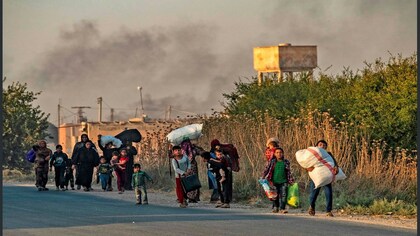How to Deter Iran When it Goes Nuclear
19:36 - 24 November 2011

How to Deter Iran When it Goes Nuclear
Last week the International Atomic Energy Agency determined that Iran is pursuing research that might be part of an effort to build nuclear weapons. The IAEA confirmed earlier U.S. intelligence that a well-organized weapons program was shelved in 2003, and the report makes it clear that ongoing work is much less ambitious. But it also found that Iran has continued to perform theoretical research on sophisticated processes that do not have obvious peaceful applications. The upshot seems to be that Iran remains interested in weaponization—at least enough to retain the scientific expertise needed if it ever decides to restart its weapons program in earnest.
The IAEA report rekindled the debate about whether we can deter a nuclear-armed Iran. Hawks worry that we cannot. Iran’s theocratic government is led by irrational and risk-acceptant religious extremists, they say, who are incapable of caution and insensitive to threats. But advocates of deterrence point out that we learned to live with equally risk-acceptant nuclear powers during the Cold War. If we could deter Joseph Stalin and Mao Zedong, why can’t we deter Ayatollah Khamanei and Mahmoud Ahmadinejad?
The prospects for deterrence depend on a related question: What exactly are we trying to deter? It is possible that we can deter some actions but not others. Similarly, the kind of deterrent threats that work against some actions may be ineffective or even counterproductive against others. Exploring the range of threatening actions (and possible U.S. responses) is useful for assessing the reliability of deterrence if and when Iran gets the bomb.
The United States are likely to try to deter four kinds of threatening actions. First, it will try to deter Iran from rapidly expanding its nascent nuclear capabilities. A burst of production would cause serious concerns about Iran’s ability to control its arsenal of weapons and stockpile of fissile material, much as Pakistan’s rapid expansion has led to fears that it is not a reliable custodian of nuclear power. Implicit or explicit threats of international isolation might help deter such an effort. The United States can emphasize the diplomatic consequences of expanding the nuclear program. Iranian leaders might believe that a large nuclear capability would gain them international prestige; the United States should warn them that it will only lead to international opprobrium.
Despite the confrontational rhetoric of President Ahmadinejad, many Iranian officials worry about deteriorating relations with the West, and some treat Ahmadinejad with disdain. Moreover, the president exerts only indirect influence over foreign and military policy. Those tasks fall to the Ayatollah Khamanei along with chief nuclear negotiator Saeed Jalili. Reminders that Iran faces a possibility of being an international pariah like North Korea, coupled with reassurances that a small arsenal is tolerable and that regime change is off the table, may be sufficient to slow the expansion of Iran’s nuclear program.
Second, the United States will seek to deter Iran from providing nuclear materials, technologies, and expertise to groups like Hezbollah. Indeed, calls for preventive action are spurred by pervasive fears that Iran will enable nuclear terrorism without being caught. Good intelligence can help deter Iran from secretly transferring nuclear material. Washington will be in a better position to deter Iran if it disabuses Tehran of the notion that it can remain anonymous. Similarly, deterring transfer may benefit from advances in nuclear forensics—the science of tracing the origin of fissile materials back to their source. If U.S. officials convince Iranian leaders that they have identified the unique signatures of Iranian uranium and plutonium, then Tehran will have additional reason to be cautious about giving fissile material to third parties.
Third, U.S. leaders will seek to deter Iran from using nuclear weapons as cover for conventional aggression or increased support to proxy groups in ways that threaten U.S. interests. Although Iran has attempted to expand its regional influence, it has also typically avoided taking on the United States directly. ”Despite its messianic pretensions,” Ray Takeyh and James Lindsay note, “Iran has observed clear limits when supporting militias and terrorist organizations in the Middle East. Iran has not provided Hezbollah with chemical or biological weapons or Iraqi militias with the means to shoot down U.S. aircraft.” But some analysts fear that Iran will be emboldened to take such risks if it believes that possessing nuclear weapons removes the danger of retaliation.
Deterring such behavior will require bolstering the local conventional balance of power. Improving the capabilities of local allies, while holding U.S. forces in reserve, is the best way to discourage Iranian adventurism without having to issue direct threats to Tehran. The Obama administration began taking steps in this direction in 2009, when Secretary of State Clinton declared a defense umbrella over the Middle East. Critically, she did not use the phrase “nuclear umbrella.” Instead, Clinton sent a clear message of deterrence by conventional denial, warning of the futility of aggression but also tacitly reassuring Iran that the United States would not pursue regime change as long as it complied. More recently, the administration completed a four-year, $123 billion arms sale to Saudi Arabia, the United Arab Emirates, Kuwait, and Oman. Presuming it proceeds as planned, the deal will allow regional powers to deter Iran directly. As one analyst concluded, “The Saudi aim is to send a message especially to the Iranians—that we have complete aerial superiority over them.”
Finally, the United States will seek to deter Iran from using nuclear weapons in war. If efforts to deter conventional conflict fail, the United States and other status quo nuclear powers will need to reinforce clear redlines against escalation to the nuclear level. In one sense this is the easiest kind of deterrence, because it is the only case in which nuclear threats will be taken seriously. There will be no need for nuance or subtlety. As Barry Posen puts it, “Iran must... be made to understand one simple thing: using nuclear weapons first or arranging for others to do so would be the path to certain annihilation. There is nothing Iran could do to prevent devastating retaliation from the United States or Israel.”
There is no one-size-fits-all approach to deterrence, and policymakers must be careful about calibrating different signals to match specific actions. Using the wrong signal may undermine the credibility of deterrent threats or needlessly provoke an overreaction. Nonetheless, deterrence against a nuclear Iran should not be terribly difficult. The United States has a number of ready options for deterring the full range of actions that Iran might consider after it acquires nuclear weapons. Regional powers have strong incentives to balance against a nuclear-armed Iran, and Washington can assist them through arms sales, diplomatic support, and offshore U.S. military capabilities. Moreover, Iran has a history of caution with the United States despite its ideological preferences. Deterrence against a nuclear Iran is likely to succeed.
Perhaps the only thing that can undermine deterrence is a preventive military strike against Iranian nuclear facilities. I will explain why in a subsequent post.
By: Joshua Rovner,The National Interest
Last week the International Atomic Energy Agency determined that Iran is pursuing research that might be part of an effort to build nuclear weapons. The IAEA confirmed earlier U.S. intelligence that a well-organized weapons program was shelved in 2003, and the report makes it clear that ongoing work is much less ambitious. But it also found that Iran has continued to perform theoretical research on sophisticated processes that do not have obvious peaceful applications. The upshot seems to be that Iran remains interested in weaponization—at least enough to retain the scientific expertise needed if it ever decides to restart its weapons program in earnest.
The IAEA report rekindled the debate about whether we can deter a nuclear-armed Iran. Hawks worry that we cannot. Iran’s theocratic government is led by irrational and risk-acceptant religious extremists, they say, who are incapable of caution and insensitive to threats. But advocates of deterrence point out that we learned to live with equally risk-acceptant nuclear powers during the Cold War. If we could deter Joseph Stalin and Mao Zedong, why can’t we deter Ayatollah Khamanei and Mahmoud Ahmadinejad?
The prospects for deterrence depend on a related question: What exactly are we trying to deter? It is possible that we can deter some actions but not others. Similarly, the kind of deterrent threats that work against some actions may be ineffective or even counterproductive against others. Exploring the range of threatening actions (and possible U.S. responses) is useful for assessing the reliability of deterrence if and when Iran gets the bomb.
The United States are likely to try to deter four kinds of threatening actions. First, it will try to deter Iran from rapidly expanding its nascent nuclear capabilities. A burst of production would cause serious concerns about Iran’s ability to control its arsenal of weapons and stockpile of fissile material, much as Pakistan’s rapid expansion has led to fears that it is not a reliable custodian of nuclear power. Implicit or explicit threats of international isolation might help deter such an effort. The United States can emphasize the diplomatic consequences of expanding the nuclear program. Iranian leaders might believe that a large nuclear capability would gain them international prestige; the United States should warn them that it will only lead to international opprobrium.
Despite the confrontational rhetoric of President Ahmadinejad, many Iranian officials worry about deteriorating relations with the West, and some treat Ahmadinejad with disdain. Moreover, the president exerts only indirect influence over foreign and military policy. Those tasks fall to the Ayatollah Khamanei along with chief nuclear negotiator Saeed Jalili. Reminders that Iran faces a possibility of being an international pariah like North Korea, coupled with reassurances that a small arsenal is tolerable and that regime change is off the table, may be sufficient to slow the expansion of Iran’s nuclear program.
Second, the United States will seek to deter Iran from providing nuclear materials, technologies, and expertise to groups like Hezbollah. Indeed, calls for preventive action are spurred by pervasive fears that Iran will enable nuclear terrorism without being caught. Good intelligence can help deter Iran from secretly transferring nuclear material. Washington will be in a better position to deter Iran if it disabuses Tehran of the notion that it can remain anonymous. Similarly, deterring transfer may benefit from advances in nuclear forensics—the science of tracing the origin of fissile materials back to their source. If U.S. officials convince Iranian leaders that they have identified the unique signatures of Iranian uranium and plutonium, then Tehran will have additional reason to be cautious about giving fissile material to third parties.
Third, U.S. leaders will seek to deter Iran from using nuclear weapons as cover for conventional aggression or increased support to proxy groups in ways that threaten U.S. interests. Although Iran has attempted to expand its regional influence, it has also typically avoided taking on the United States directly. ”Despite its messianic pretensions,” Ray Takeyh and James Lindsay note, “Iran has observed clear limits when supporting militias and terrorist organizations in the Middle East. Iran has not provided Hezbollah with chemical or biological weapons or Iraqi militias with the means to shoot down U.S. aircraft.” But some analysts fear that Iran will be emboldened to take such risks if it believes that possessing nuclear weapons removes the danger of retaliation.
Deterring such behavior will require bolstering the local conventional balance of power. Improving the capabilities of local allies, while holding U.S. forces in reserve, is the best way to discourage Iranian adventurism without having to issue direct threats to Tehran. The Obama administration began taking steps in this direction in 2009, when Secretary of State Clinton declared a defense umbrella over the Middle East. Critically, she did not use the phrase “nuclear umbrella.” Instead, Clinton sent a clear message of deterrence by conventional denial, warning of the futility of aggression but also tacitly reassuring Iran that the United States would not pursue regime change as long as it complied. More recently, the administration completed a four-year, $123 billion arms sale to Saudi Arabia, the United Arab Emirates, Kuwait, and Oman. Presuming it proceeds as planned, the deal will allow regional powers to deter Iran directly. As one analyst concluded, “The Saudi aim is to send a message especially to the Iranians—that we have complete aerial superiority over them.”
Finally, the United States will seek to deter Iran from using nuclear weapons in war. If efforts to deter conventional conflict fail, the United States and other status quo nuclear powers will need to reinforce clear redlines against escalation to the nuclear level. In one sense this is the easiest kind of deterrence, because it is the only case in which nuclear threats will be taken seriously. There will be no need for nuance or subtlety. As Barry Posen puts it, “Iran must... be made to understand one simple thing: using nuclear weapons first or arranging for others to do so would be the path to certain annihilation. There is nothing Iran could do to prevent devastating retaliation from the United States or Israel.”
There is no one-size-fits-all approach to deterrence, and policymakers must be careful about calibrating different signals to match specific actions. Using the wrong signal may undermine the credibility of deterrent threats or needlessly provoke an overreaction. Nonetheless, deterrence against a nuclear Iran should not be terribly difficult. The United States has a number of ready options for deterring the full range of actions that Iran might consider after it acquires nuclear weapons. Regional powers have strong incentives to balance against a nuclear-armed Iran, and Washington can assist them through arms sales, diplomatic support, and offshore U.S. military capabilities. Moreover, Iran has a history of caution with the United States despite its ideological preferences. Deterrence against a nuclear Iran is likely to succeed.
Perhaps the only thing that can undermine deterrence is a preventive military strike against Iranian nuclear facilities. I will explain why in a subsequent post.
By: Joshua Rovner,The National Interest



